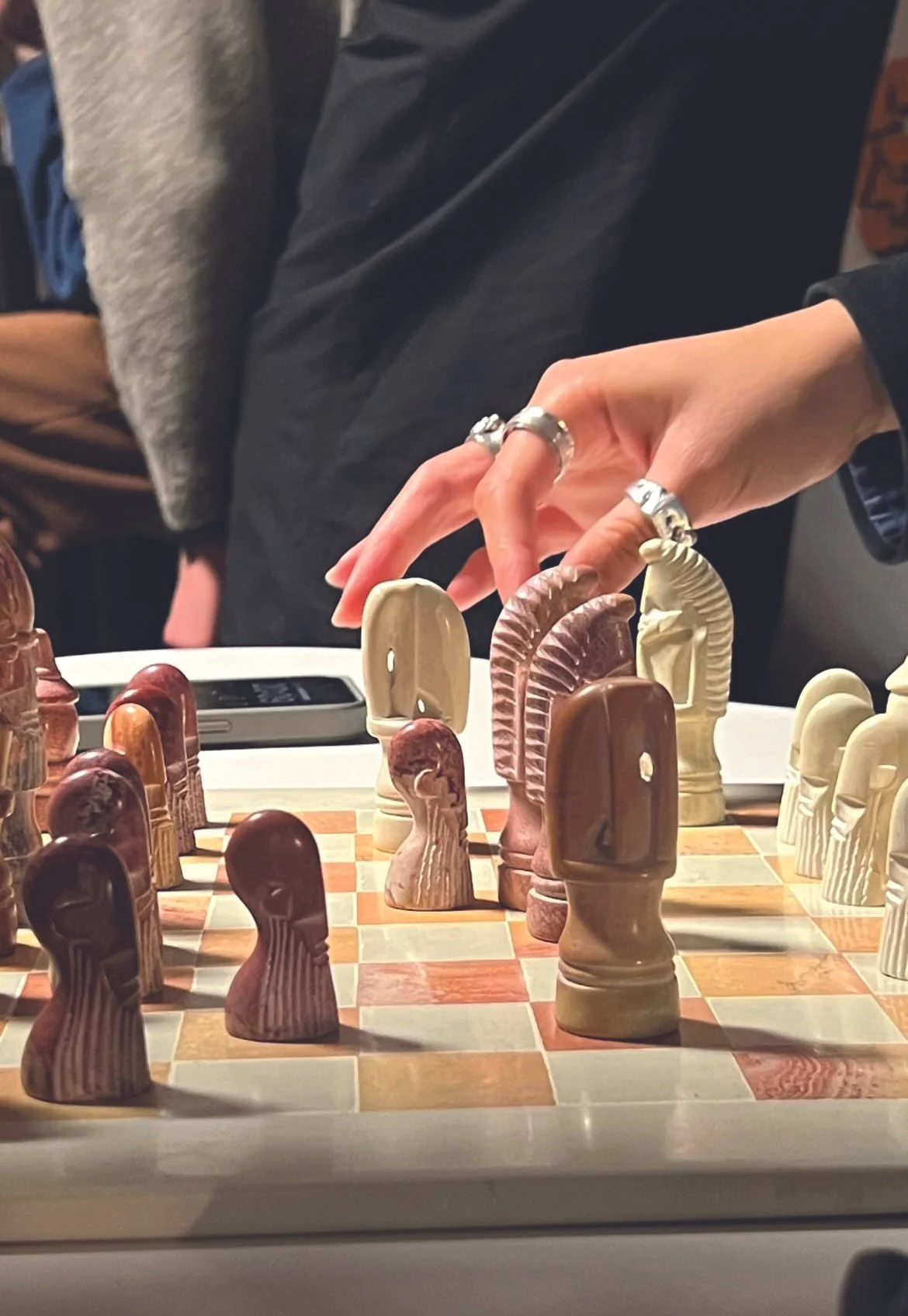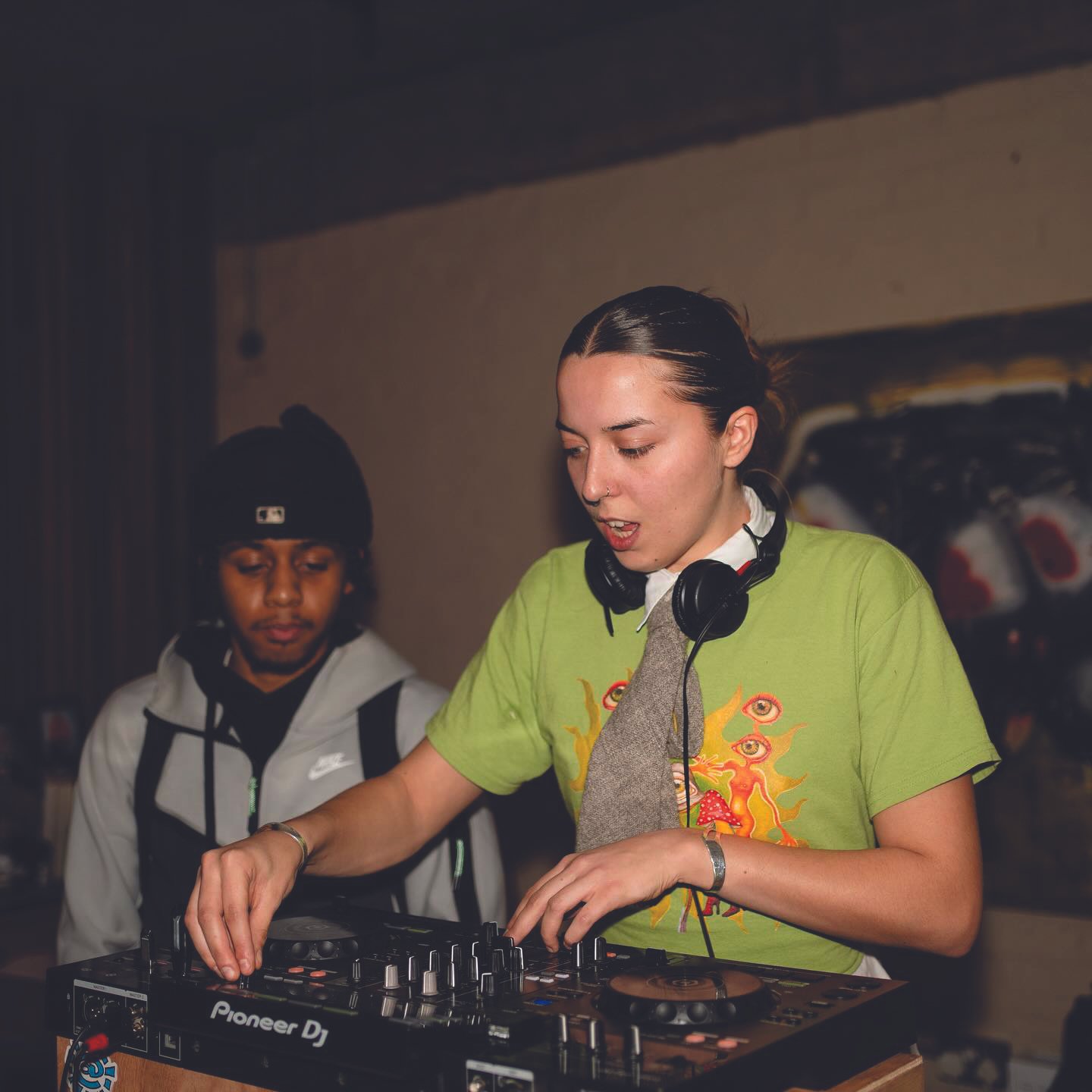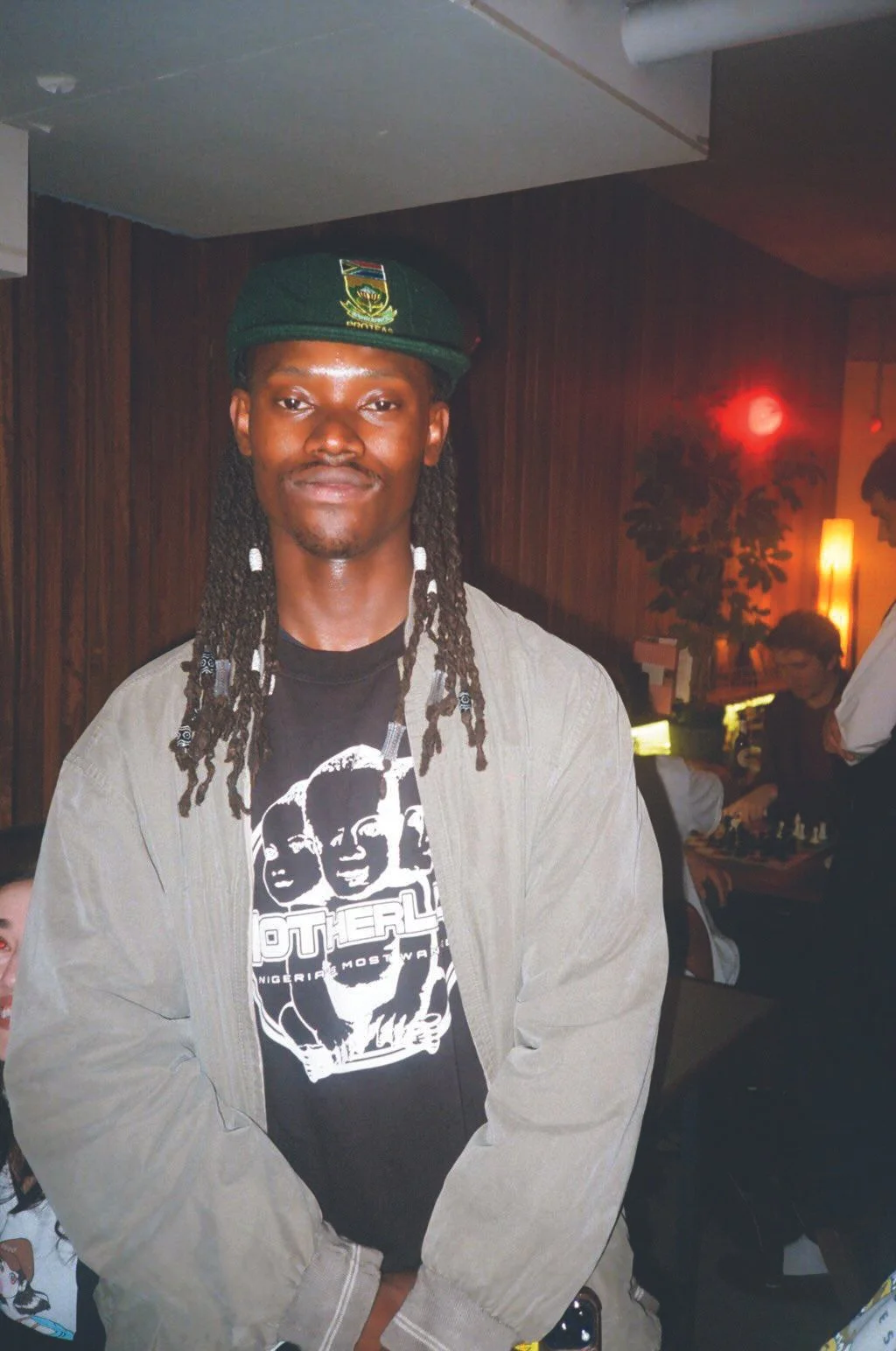A New Chess Renaissance
Whilst the domain of sticky dance floors, pulsating soundscapes, and fleeting encounters remain, a different kind of night out is emerging; one offering people a chance to slow down, centered around the quiet intensity of chess. Across the city, chess clubs are multiplying. These spaces, filled with the rhythmic taps of wooden pieces, low chatter, and hip hop, have become a sanctuary for those seeking a less overstimulating night out.
“Community and belonging has become really important.” declares Yus Ntahilaja, founder of Knight Club. Hannah Yaella, who DJs under the moniker ya-el, is an attendee of Yus’ events. For people like Hannah, chess clubs can serve as a creative catalyst. “Chess club is a great way to unwind after work, catch up with friends, and surround yourself with creative energy. You don’t have to talk to everyone, but there’s an undeniable energy in the room that can leave you feeling inspired.”
For many, these spaces provide a rare balance of structure and spontaneity; a way to engage socially without the sensory overload or the overwhelm of a traditional club night. “We need more spaces like this, everyone is vibes, I’m never this relaxed at events,” notes chess player Poppy, who attends events at a separate London-based club called CsCb. Prioritising connection and community, there’s no dress code at chess club, just a shared rhythm in the game, a structure that provides focus without pressure, making it a refuge for those who find London’s usual nightlife circuit a little too loud, too fast, and too much. The rise of chess clubs as a social alternative to drinking and clubbing marks a shift towards a more mindful and intentional lifestyle. As Hannah put it, “chess club is the new run club,” It’s effortlessly cool and exudes health without the need to repower after a long day at work.
One of the most popular new age chess clubs is Knight Club, layered across three distinct floors, each offering its own unique energy. As the night unfolds, music brings a vibrant buzz while people sit shoulder to shoulder, playing, watching, and vibing. This club is for the multitaskers; those who can balance conversation, chess, and dinner in a flow state. At Knight Club, the competition is ripe, but so is the connection. The joy that enters the room is shared, doubled, and carried forward.
The name Knight Club subverts what it means to be a nightclub in 2025, “in a time when people are drinking less and opting for softer ways of interacting with each other”. Reflecting the values of the community it inhabits, Yus shares, “it’s about redefining what nightlife means, moving it from the dance floor to the chessboard.” The promoter notes, “I wanted to create a space where people who are interested in culture naturally gather, as I aligned with that audience in other settings I had experienced.”
Checking into one of his events on a Tuesday evening, you can expect to see game-related paraphernalia such as a Loyle Carner x ADWYS mini tinned chess set out on a central table, with eager players moving the pieces delicately and with precision. Another common feature is Yus’ breathtaking Tanzanian soapstone set, for whilst chess was previously, and quite stereotypically, seen as a white man’s game, Knight Club offers a new environment in refute of this idea, bringing together a diverse community that reshapes the image of the modern player. In light of this, simple and not so simple boards adorn the rooms. Fashion plays a big part in completing the scene. With bodies blending baggy silhouettes with sharp, tactical layering, and mirroring the strategic nature of the game itself, these players ain’t playin’. United in a new aesthetic in an embrace of individuality, the people in the room stand out just as much as the multifaceted boards scattered around the rooms. As a chess player myself I feel safe in spaces like these knowing that chess belongs to no single person’s identity, and that with every move, every shared strategy, every knowing smile exchanged, the game becomes reclaimed. As RZA from Wu Tang Clan once said, “get in where you fit in”. In light of this I go to Knight Club knowing it has a place for everyone.
There’s something about chess’ tactile nature that inspires me on a personal level. Over the past few years we’ve seen a return to the use of wired headphones, a revival of old movies being played in modern cinemas, and the common use of record players. People also want to play games physically, to feel something between their fingers rather than an empty tap of a screen. It feels like a nod to simpler times when connection wasn’t dictated by algorithms. This is something that event attendees like about playing chess too. The lack of phones out at chess clubs brings a nuanced connection not usually seen in popular central London events, which can often be overrun with influencers, spectacles to be recorded and posted about rather than really experienced. For me, there’s something exceptionally pure about Knight Club. After his first session at the weekly event Emmanuel James Barco mused, “it felt nostalgic, it reminded me of when I used to go to Chess Club in primary school.”
Yus, founder of Knight Club.
It seems to me that today, people are striving for dopamine hits, but hits that come from meaningful interactions and personal victories rather than fleeting digital highs. The constant struggle of seeking external validation through social media has left people feeling drained and unsatisfied, I’m sure of it, pushing them towards slower, more tangible lives. An escape from capitalism, presence and connection does well to take the place of wealth in these new communities, making chess a powerful social equalizer. From where I’m standing it feels rare for London to feel welcome to sit with anyone in any room, no matter where you come from. Why is that, what is it that stops us from being able to sit as equals, I wonder?
However, it’s not just people on the ground that see the raw appeal of chess. Celebrities such as Loyle Carner, Skepta, and Tyler, the Creator are flocking to the game. Why? One might argue it’s a game playing tactic. As the CsCb club motto “one square better” implies, it’s not just social harmony that chess is inspiring, but also behaviours and lifestyles. The sport facilitates a cultural shift towards intentional living, sobriety, and strategy, both on and off the board. As RZA put it in The Tao of Wu, “digital culture brought a step away from truth,” and today, with the rise of icons advocating for the conquest of a niche, checkered board game over a party-hard or die-trying lifestyle, we are seeing a powerful shift in perspective. A skilled chess player navigates with patience, careful thought, and the ability to react with strategy rather than impulse. This mindset can be readily applied to real life; every decision, like every move, shaping the future. Young people in cities tend to hold a strategic focus living in the knowledge that making the right moves in life is essential for survival in the modern world.
No wonder then, chess clubs are holding people’s attention. They offer more than just a game, they offer a space to recalibrate, rediscover, and re-engage with the world and yourself. Through the rhythm of the game players tap into their own unique ways of thinking, problem solving, and processing the world. These structured yet creative spaces offer a rare equilibrium where hyperfocus is a strength, strategy is second nature, and individuality is celebrated. For creative thinkers there’s enough room to exist exactly as you are, with no masking or rushing, just the pure expression of thought.
When these spaces boom, no one loses. In my eyes, and at their core, chess games are activities where intellect, patience, and strategy take precedence over ego. When done right they create spaces where competition doesn’t mean conflict. The rise of this distinct culture in chess reveals a softer, more introspective side of men, challenging outdated notions of masculinity, ones that prize violence, impulsiveness, and emotional detachment. Here, strength is not found in dominance but in thoughtful composure.
At the same time, seeing women becoming grandmasters reinforces a sense of equality and mutual respect in a field historically dominated by men. The obsolete belief that intellect and deep focus are inherently male traits is defeated by evidence, time and time again. This quiet revolution is bringing power to the people; giving them a platform to really master their minds and become their best, most present selves.
Words: Shyla Shaikh
Edited: Sophie Yau Billington







